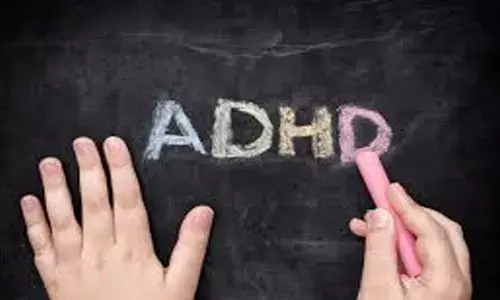- Home
- Medical news & Guidelines
- Anesthesiology
- Cardiology and CTVS
- Critical Care
- Dentistry
- Dermatology
- Diabetes and Endocrinology
- ENT
- Gastroenterology
- Medicine
- Nephrology
- Neurology
- Obstretics-Gynaecology
- Oncology
- Ophthalmology
- Orthopaedics
- Pediatrics-Neonatology
- Psychiatry
- Pulmonology
- Radiology
- Surgery
- Urology
- Laboratory Medicine
- Diet
- Nursing
- Paramedical
- Physiotherapy
- Health news
- Fact Check
- Bone Health Fact Check
- Brain Health Fact Check
- Cancer Related Fact Check
- Child Care Fact Check
- Dental and oral health fact check
- Diabetes and metabolic health fact check
- Diet and Nutrition Fact Check
- Eye and ENT Care Fact Check
- Fitness fact check
- Gut health fact check
- Heart health fact check
- Kidney health fact check
- Medical education fact check
- Men's health fact check
- Respiratory fact check
- Skin and hair care fact check
- Vaccine and Immunization fact check
- Women's health fact check
- AYUSH
- State News
- Andaman and Nicobar Islands
- Andhra Pradesh
- Arunachal Pradesh
- Assam
- Bihar
- Chandigarh
- Chattisgarh
- Dadra and Nagar Haveli
- Daman and Diu
- Delhi
- Goa
- Gujarat
- Haryana
- Himachal Pradesh
- Jammu & Kashmir
- Jharkhand
- Karnataka
- Kerala
- Ladakh
- Lakshadweep
- Madhya Pradesh
- Maharashtra
- Manipur
- Meghalaya
- Mizoram
- Nagaland
- Odisha
- Puducherry
- Punjab
- Rajasthan
- Sikkim
- Tamil Nadu
- Telangana
- Tripura
- Uttar Pradesh
- Uttrakhand
- West Bengal
- Medical Education
- Industry
LSD not efficacious in reducing ADHD symptoms compared with placebo: JAMA

Researchers have identified in a new study published in JAMA that repeated low-dose treatment with lysergic acid diethylamide (LSD) is safe but not substantially symptom-reducing in adults with attention-deficit/hyperactivity disorder (ADHD). A randomized controlled trial evaluated the safety and efficacy of microdosing LSD among patients with moderate to severe ADHD, with no difference in improvement in symptoms between LSD and placebo. The study was conducted by Lorenz M. and fellow researchers.
Microdosing of psychedelics has become of growing interest for its possible therapeutic application in psychiatric conditions, such as ADHD. LSD, especially, has been proposed to increase cognitive flexibility and executive function. But its efficacy for the treatment of ADHD symptoms is not established. To find an answer to this, a phase 2A, multicenter, double-blind, placebo-controlled trial was done at the University Hospital in Basel, Switzerland, and Maastricht University in the Netherlands.
The trial recruited 53 adult patients aged 18-65 years with a previous diagnosis of ADHD and moderate to severe symptoms (Adult Investigator Symptom Rating Scale [AISRS] score ≥26 and Clinical Global Impression Severity score ≥4). Participants were randomized to receive low-dose LSD (20 μg) or placebo twice weekly for six weeks (12 doses total). The main outcome was the difference in AISRS scores from baseline to week 6.
Key Finding
• The LSD group had a mean AISRS improvement of -7.1 points (95% CI, -10.1 to -4.0).
• The placebo group had a mean AISRS improvement of -8.9 points (95% CI, -12.0 to -5.8).
• There was no significant difference between the LSD and placebo groups in symptom reduction.
• LSD was physically safe and psychologically well tolerated.
This clinical trial concluded that repeated low-dose administration of LSD is safe but fails to decrease ADHD symptoms over placebo. These results identify the necessity of further research on alternative treatments for ADHD while further emphasizing the relevance of evidence-based practice in psychedelic medicine.
Reference:
Mueller L, Santos de Jesus J, Schmid Y, et al. Safety and Efficacy of Repeated Low-Dose LSD for ADHD Treatment in Adults: A Randomized Clinical Trial. JAMA Psychiatry. Published online March 19, 2025. doi:10.1001/jamapsychiatry.2025.0044
Dr Riya Dave has completed dentistry from Gujarat University in 2022. She is a dentist and accomplished medical and scientific writer known for her commitment to bridging the gap between clinical expertise and accessible healthcare information. She has been actively involved in writing blogs related to health and wellness.
Dr Kamal Kant Kohli-MBBS, DTCD- a chest specialist with more than 30 years of practice and a flair for writing clinical articles, Dr Kamal Kant Kohli joined Medical Dialogues as a Chief Editor of Medical News. Besides writing articles, as an editor, he proofreads and verifies all the medical content published on Medical Dialogues including those coming from journals, studies,medical conferences,guidelines etc. Email: drkohli@medicaldialogues.in. Contact no. 011-43720751


